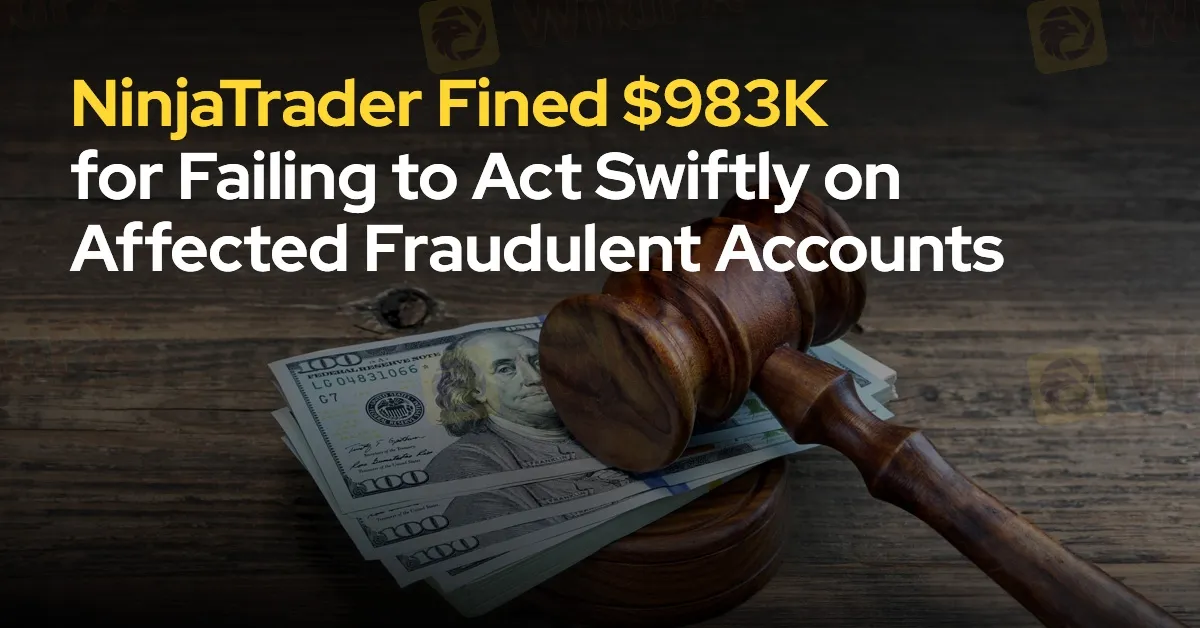简体中文
繁體中文
English
Pусский
日本語
ภาษาไทย
Tiếng Việt
Bahasa Indonesia
Español
हिन्दी
Filippiiniläinen
Français
Deutsch
Português
Türkçe
한국어
العربية
NinjaTrader Fined $983K for Failing to Act Swiftly on Affected Fraudulent Accounts
Abstract:The Commodity Futures Trading Commission (CFTC) has penalized NinjaTrader Clearing, LLC (NTC) with a fine of $983,425 for failing to adequately supervise its employees in handling accounts tied to fraudulent activities.

The Commodity Futures Trading Commission (CFTC) has penalized NinjaTrader Clearing, LLC (NTC) with a fine of $983,425 for failing to adequately supervise its employees in handling accounts tied to fraudulent activities. The Illinois-based futures commission merchant was found to have neglected its responsibility to oversee these accounts, which were flagged due to suspicion of fraud.
According to the CFTC, NinjaTrader did not act swiftly when it was ordered by a statutory restraining order (SRO) to freeze or restrict the affected accounts. The company's delay in taking action allowed the accounts to continue trading, resulting in additional losses exceeding $200,000 from open positions, further aggravating the financial damage linked to the fraudulent operations.

The regulator cited the lack of proper internal controls and emergency response procedures as a major factor in the failure. Beginning in late 2020, NinjaTrader reportedly did not put in place effective measures to manage court orders involving flagged accounts. Even after receiving the SRO in January 2022, the firm allowed the suspect accounts to remain active, contributing to ongoing financial losses.
As part of the settlement, NTC agreed to pay a civil fine of $750,000 and an additional $233,425 in restitution. This restitution will be allocated to victims who were affected by the fraudulent activities connected to the case.
This enforcement follows a similar regulatory action by the CFTC, which recently fined Nasdaq Futures $22 million for violations tied to its incentive programs. Nasdaq Futures, a former designated contract market (DCM) that operated between July 2015 and July 2018, offered an incentive program called the DMM (Designated Market Maker) program.
Although the firm disclosed a fixed stipend for market makers, the CFTC found that it failed to properly disclose a volume-based payment structure that rewarded certain users, thereby violating regulations. Additionally, the regulator noted that Nasdaq Futures provided inaccurate information during its inquiries into the matter.
These recent penalties reflect the CFTC's ongoing efforts to enforce compliance in the commodities and futures markets. By holding firms accountable for lapses in oversight and transparency, the regulator aims to maintain the integrity of the financial system and protect investors from harmful practices.
Market participants are urged to remain compliant and ensure that their operational procedures align with regulatory standards to avoid similar enforcement actions in the future.

Disclaimer:
The views in this article only represent the author's personal views, and do not constitute investment advice on this platform. This platform does not guarantee the accuracy, completeness and timeliness of the information in the article, and will not be liable for any loss caused by the use of or reliance on the information in the article.
Read more

Gold Prices Fall Instead of Rising, Hitting a Two-Week Low
Despite geopolitical tensions, gold prices have dropped sharply, reaching a two-week low. Markets refocus on Fed policy and broader macro trends.

Nigeria to Launch Sweeping Cybersecurity Reforms Amid Rising Digital Threats
With cyber threats escalating and economic losses exceeding ₦250 billion annually, Nigeria is launching comprehensive reforms to safeguard its digital future and build a more resilient cybersecurity infrastructure.

Overlooking Broker Spreads? It’s Costing You More Than You Think
In the ever-competitive world of online trading, where margins are slim and timing is everything, traders often obsess over entry strategies, risk management, and technical setups. Yet one critical element is routinely underestimated, if not outright ignored, especially by retail and novice traders alike, is the broker’s spread.

Reviewing CFreserve - Regulation Status, Operation Period & More
Has CFreserve deceived you financially? Did you face problems regarding forex investment withdrawals with this broker? You’re not alone! Read this exposure story to know how it's duping investors.
WikiFX Broker
Latest News
OneRoyal Expands to Oman, Strengthening Forex Trading in MENA
Govt Imposes Import Curbs on Precious Metal to Stop Liquid Gold Inflow
Reviewing CFreserve - Regulation Status, Operation Period & More
Starlink rival Eutelsat pops 22% as France backs capital raise
The Fed held interest rates steady, but some credit card APRs keep going up. Here's why
Meta, EssilorLuxottica unveil Oakley smart glasses
Important Statement on the Authenticity of WikiFX Score and Broker Reviews
JPMorgan to Launch JPMD Deposit Token
Kroger's shares rise as grocer says shoppers seek lower prices, cook more at home
Circle shares extend their rally after Senate passes landmark stablecoin bill
Currency Calculator


